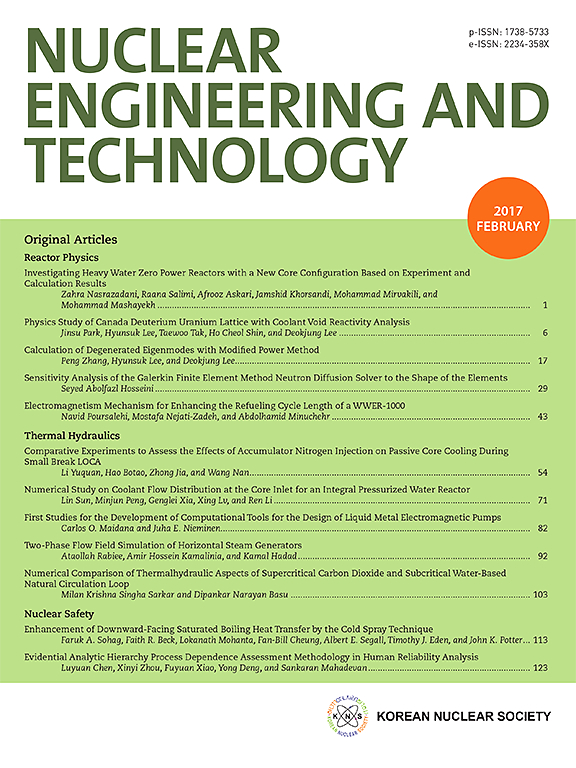Stringent environmental policies: How they shape the future of nuclear energy generation
IF 2.6
3区 工程技术
Q1 NUCLEAR SCIENCE & TECHNOLOGY
引用次数: 0
Abstract
Nuclear energy is a low-carbon energy source that can replace fossil fuels in the energy mix. However, the serious risks associated with nuclear energy generation must be effectively managed. Environmental policy stringency can counter these risks by compelling the polluted firms and industries to switch to clean energy sources, thereby enhancing the production of alternative and clean energy sources, including nuclear energy. Empirical evidence in this context is missing, confirming a gap in the nuclear energy literature. In order to plug this gap, this research examines how stringent environmental policies can enhance nuclear energy generation in the leading 18 nuclear energy-producing nations from 1995 to 2021. In order to examine the empirical connection between environmental policy and nuclear energy generation, we employ the CS-ARDL model. The results indicate that stringent environmental policies lead to a decline in long-term nuclear energy generation. Nonetheless, the environmental policy does not affect short-term nuclear energy generation. Moreover, environmental technology, financial advancement, and sustainable development significantly enhance long-term nuclear energy generation. In the short term, all these variables do not substantially affect nuclear energy generation except environmental technology, which improves nuclear energy generation. Given the significance of environmental policy stringency for nuclear energy production, we suggest that the government needs to implement strict environmental policies with a special focus on the energy sector.
严格的环境政策:它们如何塑造核能发电的未来
核能是一种低碳能源,在能源结构中可以取代化石燃料。然而,与核能发电有关的严重风险必须得到有效管理。严格的环境政策可以迫使受污染的公司和工业转向清洁能源,从而提高包括核能在内的替代能源和清洁能源的生产,从而抵消这些风险。在这方面缺乏经验证据,证实了核能文献中的空白。为了填补这一空白,本研究考察了从1995年到2021年,严格的环境政策如何能提高18个主要核能生产国的核能发电。为了检验环境政策与核能发电之间的经验联系,我们采用了CS-ARDL模型。结果表明,严格的环境政策导致长期核能发电的下降。尽管如此,环保政策不会影响短期的核能发电。此外,环境技术、金融进步和可持续发展显著增强了核能的长期发电能力。在短期内,除了环境技术改善核能发电外,所有这些变量都不会对核能发电产生实质性影响。鉴于严格的环境政策对核能生产的重要性,我们建议政府需要实施严格的环境政策,并特别关注能源部门。
本文章由计算机程序翻译,如有差异,请以英文原文为准。
求助全文
约1分钟内获得全文
求助全文
来源期刊

Nuclear Engineering and Technology
工程技术-核科学技术
CiteScore
4.80
自引率
7.40%
发文量
431
审稿时长
3.5 months
期刊介绍:
Nuclear Engineering and Technology (NET), an international journal of the Korean Nuclear Society (KNS), publishes peer-reviewed papers on original research, ideas and developments in all areas of the field of nuclear science and technology. NET bimonthly publishes original articles, reviews, and technical notes. The journal is listed in the Science Citation Index Expanded (SCIE) of Thomson Reuters.
NET covers all fields for peaceful utilization of nuclear energy and radiation as follows:
1) Reactor Physics
2) Thermal Hydraulics
3) Nuclear Safety
4) Nuclear I&C
5) Nuclear Physics, Fusion, and Laser Technology
6) Nuclear Fuel Cycle and Radioactive Waste Management
7) Nuclear Fuel and Reactor Materials
8) Radiation Application
9) Radiation Protection
10) Nuclear Structural Analysis and Plant Management & Maintenance
11) Nuclear Policy, Economics, and Human Resource Development
 求助内容:
求助内容: 应助结果提醒方式:
应助结果提醒方式:


